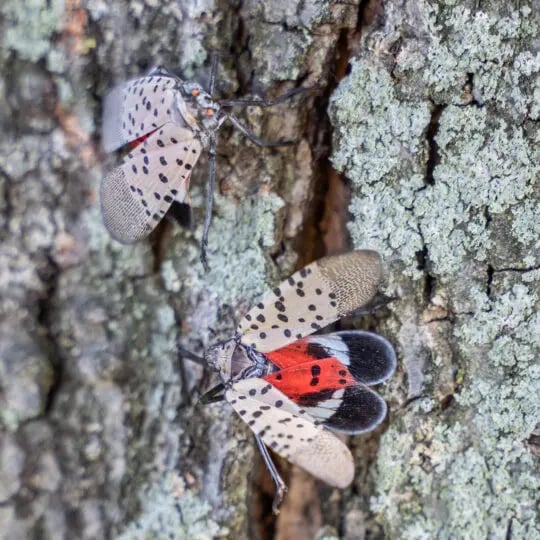10 Facts About Spotted Lanternflies

Lanternflies are, unfortunately, everywhere right now. Step outside in our service areas of Pennsylvania, Delaware, and New Jersey, and you’re bound to spot a few. Read on to learn 10 facts about spotted lanternflies.
10 Facts About Spotted Lanternflies
- They haven’t been in the US for long. They were discovered in Berks County, Pennsylvania in 2014.
- They come from Asia. They are native to China, India, and Vietnam.
- They have a tree of heaven. The lanternflies pick out a “tree of heaven” that they take over and eventually kill. Adults prefer willow trees. For nymphs. these trees are usually:
- Willow
- Maple
- Poplar
- Prunus trees
- Apple
- Pine
- Grapevines
- They have surprising relatives. Spotted lanternflies might look like moths, but they’re not related to that flying, winged pests. They are planthoppers and related to cicadas and aphids.
- They are safe here. Spotted lanternflies don’t have any natural predators in the United States.
- The adults stick around for one season. You will see adult lanternflies from June until August. They then lay eggs in the fall that don’t hatch until May.
- Winter is the best time to fend off an infestation. Because they lay their eggs in the fall, you can spend wintertime finding the mass of eggs and getting rid of them because the eggs hatch in the spring and cause trouble.
- Their life cycle is one year long. The eggs lay dormant from fall until spring. They spend late spring as nymphs until they reach adulthood during the summertime.
- Flying isn’t a strength. They aren’t great at flying, even though they have two sets of wings. While some can fly better than others, you’re more likely to see it hop around than fly.
- You can help get rid of them. Because spotted lanternflies don’t have natural predators, we need to take control in our own hands. You can work with a company like Green Lawn Fertilizing to get rid of the ones invading your lawn or go with an insecticide or tree wrap you can find at a home improvement store.
🚨 Always remember to report sightings to your local department of agriculture.
For help with spotted lanternfly control, call us today at 855-469-0692.